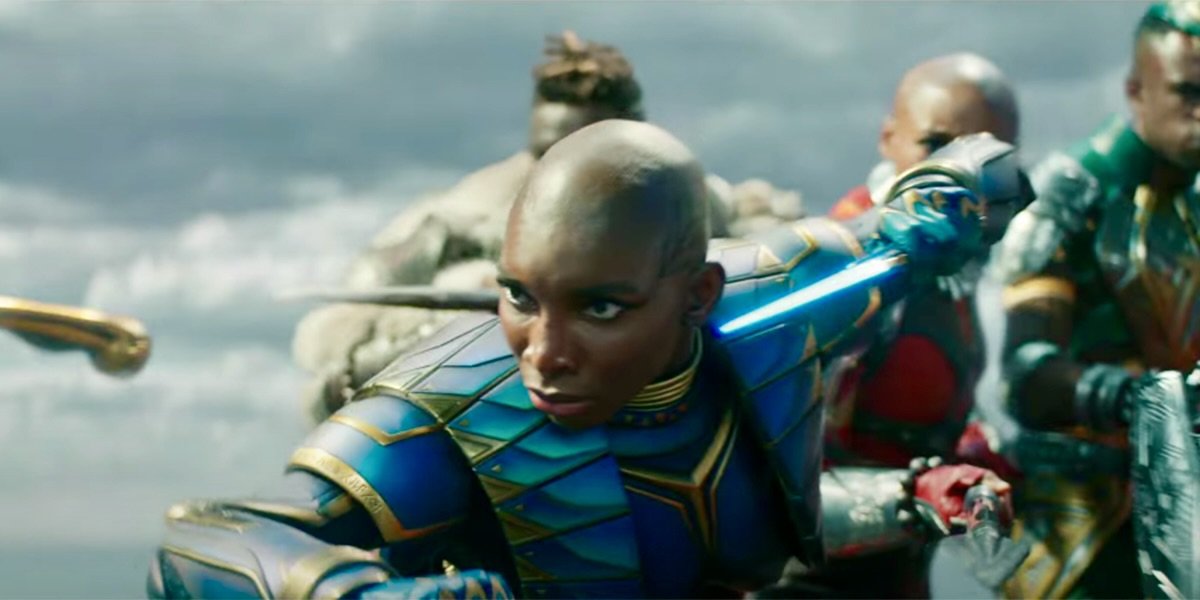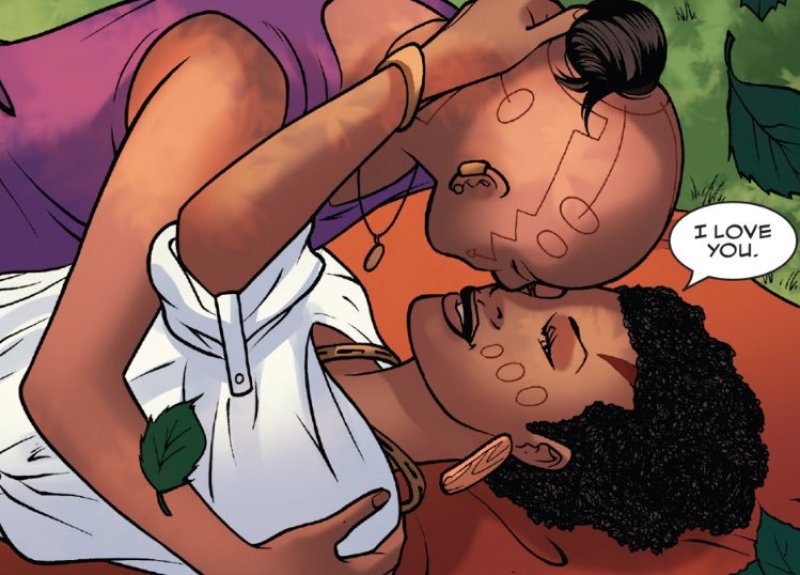In her cover profile for Vogue, published today and written by Chioma Nnadi, Michaela Coel talks about her excitement for next month’s Black Panther sequel, Wakanda Forever. Specifically, Coel notes, she was drawn to her character, Aneka’s history in the comics, “That sold me on the role, the fact that my character’s queer.”
In the comics, and in particular I’m talking about Ta-Nehisi Coates’ famed run of Black Panther from 2016-2018 and Roxane Gay’s spin-off Word of Wakanda (which is how I learned how to read comics in the first place), Aneka — who will be played by Coel in the film — is a captain and combat instructor for the Dora Milaje, the women warriors who are the royal family’s security and protectors of Wakanda. Aneka falls in love with Ayo, played by Florence Kasumba in various MCU properties, and together they leave the Dora Mliaje to lead a separate group, the Midnight Angels. The Midnight Angels create what’s essentially women’s commune on the outer planes of Wakanda and use their skills to help train other Wakandan women in self-defense to protect themselves. Imagine if feminist land dykes were Afrofuturist and you’ll start to get the picture. It’s great.

Speaking of Aneka’s queerness and drive to protect other women, Coel says “I like that, I want to show that to Ghana.” She continues, speaking about the current anti-gay law being brought forth in Ghanaian parliament, poised to be some of the most strict and dangerous in the continent. If passed, the proposed law would make identifying as gay (or a gay ally) a second-degree felony punishable by up to five years in prison. “People say, ‘Oh, it’s fine, it’s just politics.’ But I don’t think it is just politics when it affects how people get to their daily lives… That’s why it felt important for me to step in and [play the role of Aneka] because I know that just by my being Ghanaian, Ghanians will come.”
After rumors that a brief queer flirtation between head of the Dora Milaje, Okoye (Danai Gurira) and Ayo was cut from the 2018 Black Panther film, on top of a litany of similarly “cut for time” or “extraneous to the story” queer scenes or characterizations that have been removed from a variety of MCU films, most often on the backs of queer women of color, it’s hard to hold my breath for a queer Aneka in World of Wakanda — I’m just a Black queer nerd who really can’t afford another superhero-sized heartbreak. But there’s a specific tone of how Coel speaks about Aneka that makes me think this time it might be different. Coel’s not talking about Aneka’s identity, she’s talking about Aneka’s politics, the entire whole of who she is.
For so many of us, queerness is not about who we lay with at night — it’s about who we are when we wake up in the morning.
The reason I fell in love with the World of Wakanda comics was not just because of its queer love story, but that two Black women loved each other so much, saw beauty and power in the reflections of themselves across their lover’s face, that they wanted to care and love for other Black women. Queer Black women, being written by a queer Black woman, in all of our majesty. The knowledge that our royalty, our richness, our magic was in each other all along. It’s queerness as a root praxis, not a swooping kiss when the credits roll.

It’s hard to imagine bringing in Aneka to Wakanda Forever if her queerness is not going to be written into the script, because it’s her defining characteristic. It’s also not worth ignoring the obvious, Kevin Feige and the powers that be at Marvel studios have disappointed too many times before. That said, there are other glimmers of hope. In July’s Wakanda Forever trailer, Aneka can be seen in her Midnight Angels uniform. In the newest film posters released this week, Okoye is also wearing the Midnight Angels’ signature blue. The Midnight Angels are born out of a Black queer love story. To straight wash them would not only be cruel, it would dismantle the fabric of their very existence.
Coel seemingly knows as much, directly linking her portrayal of Aneka in what’s certain to be the highest grossing Black film, potentially ever in history if it can topple its predecessor, to the lived realities of queer people in her family’s home in Ghana, who are fighting for to survive. And in the pages of Vogue, no less.
When we talk about “queer representation” — especially in blockbuster movies, such as, I don’t know, the ones about superhero lineage Kings and Queens who wear indestructible suits made from vibranium — it’s easy to get caught up in the statistics. According to GLAAD, for example, out of the the 44 films from major studios in 2020, only 10 contained LGBTQ characters. Out of all studio releases in 2020, there were just 20 LGBTQ characters, a decrease from the year before’s 50. But focusing on the numbers also allows for studios to escape with doing bare minimum, mere boxes to check off. A character can mention “I have a dead ex-girlfriend who you’ve never seen” and now that counts. A kiss that can be missed in a blink of an eye, now that counts. It’s tricky to talk about in concrete terms, but “representation” can be a glass sealed box. What feels like freedom can just as easily stifle.
Because really, it’s never been about the numbers, it’s about telling our stories in the fullness of who we are.



“For so many of us, queerness is not about who we lay with at night — it’s about who we are when we wake up in the morning.”
YES CARMEN!!
You’re such a beautiful writer, Carmen. I love Michaela for being so proud of this role and for choosing it to give hope to LGBTQ+ Ghanaian people.
Well, the lesbian kiss between Aneka and Ayo was definitely there…though that’s more than I can say for coverage of “Black Panther: Wakanda Forever” at Autostraddle!
[Thar Be Spoilers Below]
*
*
*
*
Damn, I was looking forward to a meaty review here—and also discussion. It’s definitely a far more female-centric film than “BP” . . . but how do you watch Shuri grow into the hero she was meant to be, at the same time you’re watching transphobe Letitia Wright? (I wrestled through that all through the film.) Even though early on, the movie seems to be throwing an “Enemies-to-Lovers” trope in your face (Shuri and Namor), how does one juxtapose that with the fact that Shuri essentially misses her own coronation, in order to take up Nakia on her invitation to come live with her in Haiti? [Hello!]
There was a lot to talk about here, and I had hoped that dialogue could be at AS. Surprised it’s not.